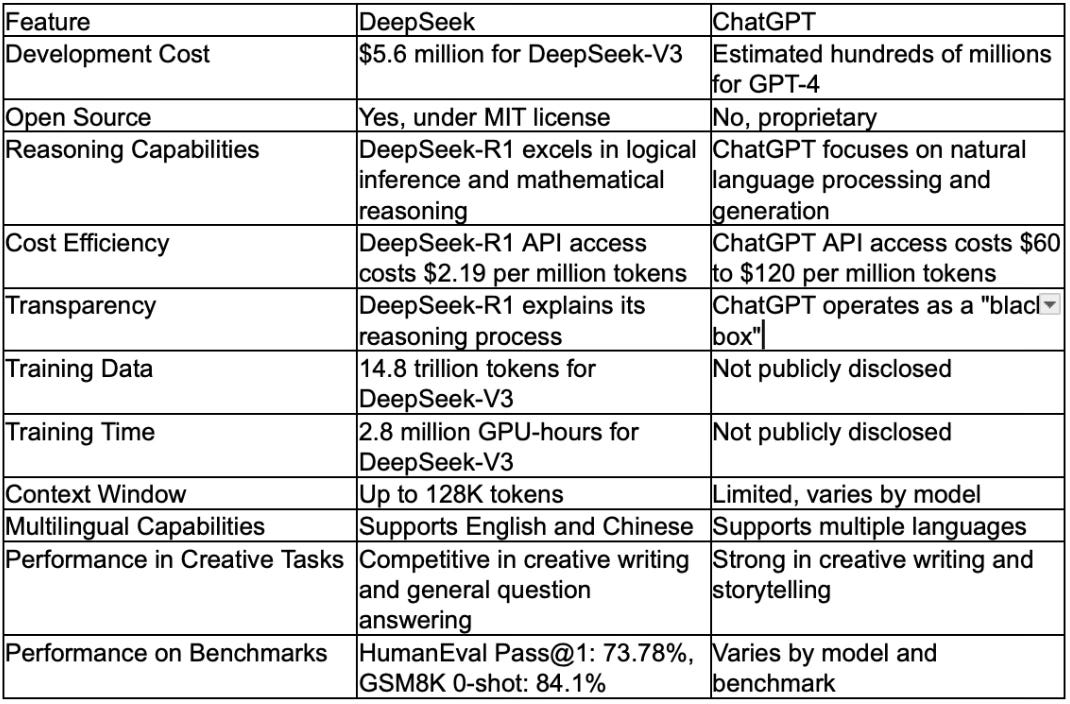"Things are not always as they seem; the first appearance deceives many." – Phaedrus
There has been a whirlwind of activity in the AI world, with new models and advancements emerging quickly. Recent headlines about Stargate, $500B, AGI, and do we trust Sam Altman! They are all fantastic stories.
But amidst all the noise, one story stands out: DeepSeek.
Is this Chinese AI startup the most interesting development since ChatGPT's debut? I think it is, but most of the market and news have it wrong.
The release of DeepSeek is excellent news.
Here's why.
Author's Note: I could have this analysis wrong. Please let me know what I got right, what I got wrong, and where I should take this story.
The Four Minute Mile
In track and field, the four-minute mile stood as an insurmountable wall. Experts proclaimed it impossible, arguing that the human body wasn't built to endure the strain of such a feat. It was a fixed mindset masquerading as science—a "limit" that shaped training methods, strategies, and ambitions.
Then, on May 6, 1954, Roger Bannister shattered this notion by running the mile in 3 minutes and 58 seconds.1
What's remarkable isn't just the time—it's the domino effect that followed. Once Bannister proved it could be done, others quickly followed, breaking the same barrier. More than ten runners broke the 4-minute barrier in the next 2.5 years. Thousands have now done it.
The lesson is clear: the most significant constraints aren't physical; they're mental models that we allow to go unchallenged. Leadership is about redefining what's possible, just like Bannister did. This impact even has a name – the Bannister Effect.
The Four-Minute Mile of AI
The AI landscape has been dominated by a select few, well-funded companies in the West. Building cutting-edge AI models requires massive computational resources, billions of dollars in investment, and access to the latest hardware. This created a perception that AI innovation was an exclusive club accessible only to those with deep pockets.
DeepSeek has arrived, shattering all notions of cost and barriers to entry. And now others will follow their lead.
Like Roger Bannister, who broke the four-minute mile, DeepSeek has redefined what's possible in AI development. With its DeepSeek-R1 model, the company has demonstrated that world-class AI doesn't necessarily require exorbitant budgets or the latest and greatest hardware.
This breakthrough has sent shockwaves through the industry, causing a reassessment of AI investment strategies and sparking excitement about the potential for democratizing AI.
A new set of AI model companies will have a template and blueprint for competing with a new set of approaches and constraints.
DeepSeek vs. ChatGPT – A Comparison
Here is a comparison of DeepSeek to ChatGPT.
*Note: I generated this comparison using Google Gemini. These "facts" are not verified*
Note the "cost efficiency" line – $2.19 per million tokens versus $60 (or more) per million tokens. A "token" in AI is a small piece of text, like a word or character, that an AI model processes to generate or analyze language. Cost per token is key because it directly impacts the efficiency and expense of running AI applications.2
This cost efficiency reset is also directly tied to the energy efficiency required.
“Cost per token”is the unit cost that matters in AI!
Not the Story
DeepSeek vs. ChatGPT is not the story. The fact that DeepSeek is a Chinese company is not the story, but being an open-source model might be part of the story.
But the story definitely is this: Better, faster, cheaper always wins.
While DeepSeek isn't "better" yet, it is an order of magnitude cheaper to create and operate than current LLMs. And this changes everything.
A new set of AI model companies now have a template and blueprint for competing with a new set of approaches and constraints.
This story is impactful because it resets what's possible and sets the stage for another of companies and models which will be better, faster, cheaper.
We want a country where innovation thrives, not just from and for large companies or startups requiring billions of dollars of investments, but from and for companies of all sizes and aspirations.
The lesson is clear: the most significant constraints aren't physical; they're mental models that we allow to go unchallenged. Leadership is about redefining what's possible, just like Bannister did. This impact even has a name – the Bannister Effect. — John Rossman
We also want a country where advancement in AI does not require as much energy, infrastructure, and data center investment. "Efficient AI" is a much better future.
The news about DeepSeek resets "what is possible", just like the release of ChatGPT on 11/30/22 did and just like Roger Bannister’s 4 minute mile did.
The DeepSeek breakthrough will create a domino effect spurring better, cheaper, faster AI innovation.
And that, my friends, is excellent news.
What am I missing?
Please share this free post with your team.
Onward!
John
About The Digital Leader Newsletter
This is a newsletter for change agents, strategists, and innovators. The Digital Leader Newsletter is a weekly coaching session focusing on customer-centricity, innovation, and strategy. We deliver practical theory, examples, tools, and techniques to help you build better strategies, better plans, and better solutions — but most of all, to think and communicate better.
John Rossman is a keynote speaker and advisor on leadership and innovation. Learn more at www.johnrossman.com.
Four Minute Mile. (2025, January 18). In Wikipedia. Four Minute Mile. (2025, January 20). In Wikipedia. https://en.wikipedia.org/wiki/Four-minute_mile
Here’s a helpful more technical review of DeepSeek versus ChatGPT https://medium.com/@sahin.samia/deepseek-r1-explained-pioneering-the-next-era-of-reasoning-driven-ai-3eeb5ac4d4a0







I love the Perfect Mile analogy John. Well done. Here is a congruent argument in The Free Press.
https://www.thefp.com/p/why-deepseek-is-a-gift-to-the-american?utm_source=substack&utm_medium=email
Maybe. I’m optimistic, as you are, John. I’m also highly skeptical of any claims of Chinese origin. Followers, duplicaters, stealers…yes. Innovators, much less so. Ground breakers, rarely.